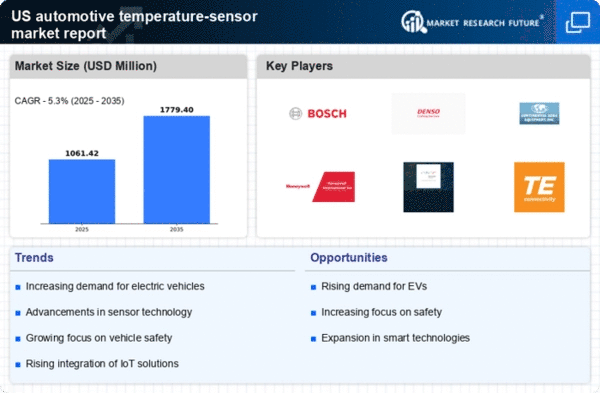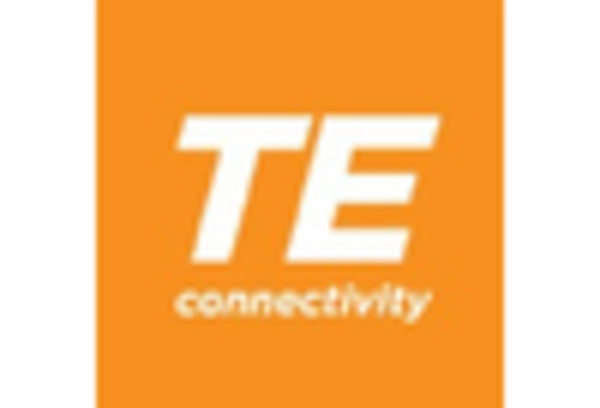Emergence of Autonomous Vehicles
The automotive temperature-sensor market is likely to benefit from the emergence of autonomous vehicles. These vehicles require sophisticated sensor systems for safe operation. Autonomous vehicles rely on a multitude of sensors, including temperature sensors, to monitor various components and ensure optimal functioning. The market for autonomous vehicles is projected to grow exponentially, with estimates suggesting that by 2030, over 25 million autonomous vehicles could be on the roads. This growth necessitates the development of advanced temperature-sensing technologies that can operate reliably in diverse conditions. As manufacturers invest in research and development to enhance the safety and efficiency of autonomous systems, the automotive temperature-sensor market is expected to expand in tandem, driven by the need for accurate and reliable temperature data.
Increasing Focus on Fuel Efficiency
The automotive temperature-sensor market is propelled by the increasing focus on fuel efficiency among manufacturers. As fuel prices fluctuate, there is a growing emphasis on developing vehicles that consume less fuel while maintaining performance. Temperature sensors play a critical role in optimizing engine performance and fuel consumption by providing real-time data to engine control units. This data allows for precise adjustments to fuel injection and ignition timing, ultimately enhancing fuel efficiency. The automotive industry is witnessing a shift towards more fuel-efficient technologies, with many manufacturers aiming for a 20% reduction in fuel consumption by 2027. This trend is likely to drive the demand for advanced temperature-sensing solutions, as they are integral to achieving these efficiency targets in modern vehicles.
Growth of the Automotive Electronics Sector
The automotive temperature-sensor market is significantly influenced by the rapid growth of the automotive electronics sector. As vehicles increasingly incorporate electronic components, the need for reliable temperature sensors becomes paramount. The automotive electronics market is expected to reach a valuation of over $300 billion by 2026, with temperature sensors playing a crucial role in ensuring the efficiency and safety of electronic systems. These sensors are vital for monitoring temperatures in critical areas such as engine control units and climate control systems. The integration of temperature sensors into these electronic systems not only enhances performance but also contributes to energy efficiency, which is a growing concern among manufacturers and consumers alike. This trend indicates a robust future for the automotive temperature-sensor market as it aligns with the broader shift towards more electronic-driven vehicles.
Technological Advancements in Sensor Technology
The automotive temperature-sensor market is experiencing a transformation due to technological advancements in sensor technology. Innovations such as MEMS (Micro-Electro-Mechanical Systems) and wireless sensor networks are enhancing the capabilities of temperature sensors. These advancements allow for more compact, accurate, and reliable sensors that can be integrated into various automotive applications. The market for MEMS-based sensors is anticipated to grow at a CAGR of around 10% over the next few years, indicating a strong demand for these technologies in the automotive sector. As manufacturers seek to improve vehicle performance and safety, the integration of advanced temperature sensors becomes increasingly critical. This trend suggests a promising future for the automotive temperature-sensor market as it adapts to the evolving needs of the automotive industry.
Rising Demand for Advanced Driver Assistance Systems
The automotive temperature-sensor market experiences a notable boost due to the increasing demand for advanced driver assistance systems (ADAS). These systems rely heavily on accurate temperature readings to ensure optimal performance and safety. As vehicles become more technologically advanced, the integration of temperature sensors in ADAS applications is essential. The market for ADAS is projected to grow at a CAGR of approximately 15% over the next few years, which directly influences the automotive temperature-sensor market. The need for precise temperature monitoring in various vehicle components, such as engines and batteries, further drives this demand. Consequently, manufacturers are focusing on developing innovative temperature-sensing solutions that can withstand harsh automotive environments, thereby enhancing the overall functionality of ADAS.
















